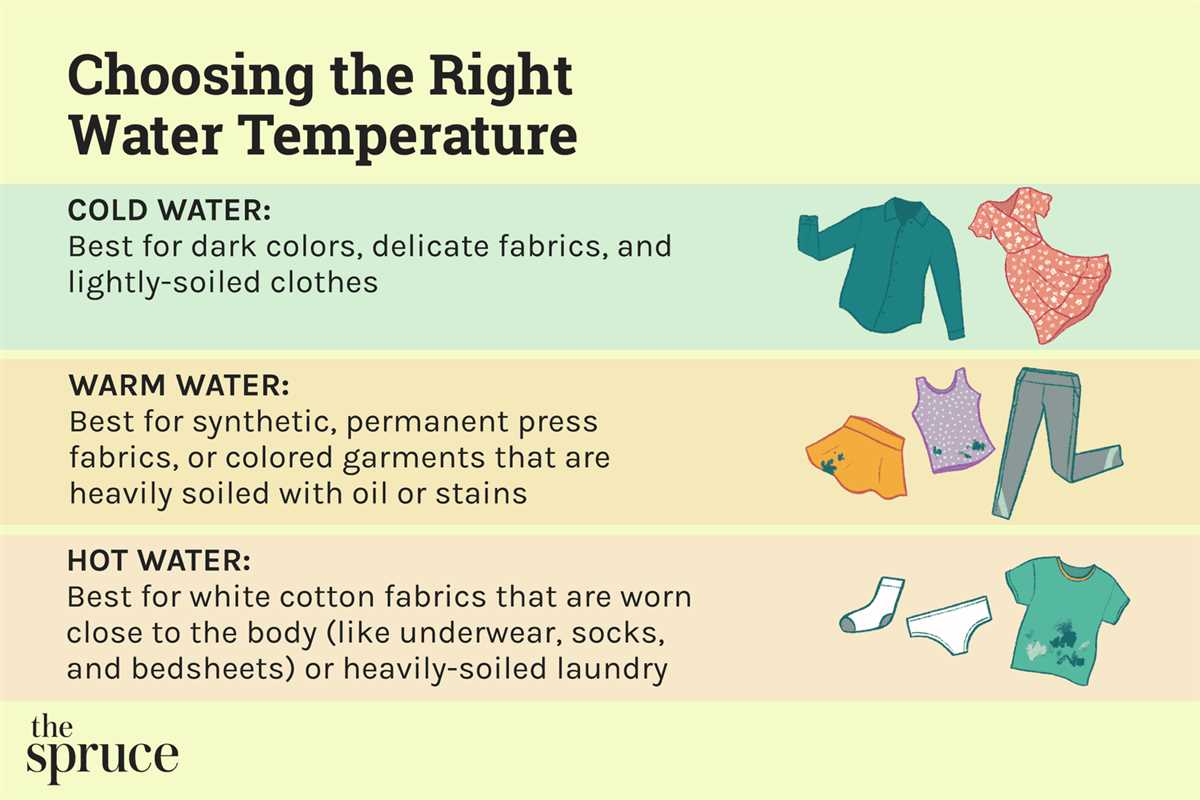




When it comes to doing laundry, it’s important to know how long each wash cycle takes. This is especially true when it comes to delicate items, as they require a gentler wash to prevent damage. So, how long does a delicate wash cycle normally take? In this expert guide, we will explore the different factors that can affect the duration of a delicate wash cycle and provide you with some helpful tips to ensure your delicate items come out clean and undamaged.
Firstly, it’s important to understand that the duration of a delicate wash cycle can vary depending on the specific washing machine model you are using. However, on average, a delicate wash cycle usually takes anywhere from 30 minutes to 1 hour. This shorter duration is necessary to prevent over-agitation and minimize the risk of damage to delicate fabrics, such as silk, lace, and cashmere.
Additionally, the duration of a delicate wash cycle can also be affected by the size of the load. If you are washing a smaller load of delicate items, the cycle may take less time as there is less fabric to clean. On the other hand, a larger load may require a longer wash cycle to ensure thorough cleaning and proper rinse cycles.
Lastly, the temperature of the water can also impact the duration of a delicate wash cycle. Delicate items typically require a colder water temperature to prevent shrinkage and maintain the integrity of the fabric. Therefore, if your washing machine has a temperature control feature, it’s important to select the appropriate setting for delicate items, which may increase the overall duration of the cycle.
In conclusion, a delicate wash cycle typically takes anywhere from 30 minutes to 1 hour, depending on the specific washing machine model, load size, and water temperature. It’s important to follow the garment’s care instructions and use the appropriate cycle to ensure your delicate items come out clean and undamaged. By understanding these factors and taking the necessary precautions, you can maintain the longevity of your delicate clothes while keeping them fresh and clean.
How Long Does a Delicate Wash Cycle Normally Take?
When it comes to doing laundry, many people have different preferences for how long they want their wash cycles to last. This is especially true for delicate items that require extra care. In general, a delicate wash cycle on a washing machine can take anywhere from 30 minutes to over an hour, depending on the specific machine and settings used.
Factors That Determine the Duration of a Delicate Wash Cycle
Several factors can affect how long a delicate wash cycle takes:
- Type of Machine: Different washing machines have different default settings and cycle durations. Some machines have specific delicate or hand wash cycles that are shorter in duration to prevent damage to delicate fabrics.
- Load Size: The size of the load being washed can impact the duration of the cycle. Larger loads may require more time and water to ensure proper cleaning and rinsing of the delicate items.
- Soil Level: If the delicate items are heavily soiled, the wash cycle may need to be longer to remove stains and dirt effectively.
- Water Temperature: Depending on the fabric and stain, different water temperatures may be required, which can affect the duration of the wash cycle.
- Extra Options: Some washing machines offer additional options such as pre-wash, extra rinse, or gentle spin, which can lengthen the overall wash cycle.
Tips for a Faster Delicate Wash Cycle
If you’re looking to reduce the duration of your delicate wash cycle, here are a few tips:
- Sort your laundry properly, separating delicate items from regular clothes.
- Choose the appropriate cycle for delicate items, if your machine has specific settings for them.
- Use proper detergent and follow the recommended dosages to ensure efficient cleaning.
- Avoid overloading the machine as it can prolong the wash cycle.
- Consider using a faster spin speed to shorten the overall cycle time.
Conclusion
While the duration of a delicate wash cycle can vary depending on various factors, it typically lasts between 30 minutes to over an hour. By understanding these factors and following the tips mentioned above, you can ensure that your delicate items are properly cared for while still minimizing the overall wash time.
Understanding the Duration of a Delicate Wash Cycle

A delicate wash cycle is a specialized setting on washing machines that is designed to gently clean delicate fabrics such as lace, silk, and wool. Understanding the duration of a delicate wash cycle is important to ensure that your delicate garments are being properly cared for.
Factors Affecting the Duration
The duration of a delicate wash cycle can vary depending on several factors, including:
- The specific washing machine model
- The size of the load
- The level of soil or stains on the garments
- The selected temperature and spin settings
These factors can influence the length of the wash cycle, as the machine adjusts the washing time based on the individual load’s needs.
Average Duration
On average, a delicate wash cycle can last anywhere from 15 minutes to 1 hour. However, it’s important to note that this is just a general guideline, and the actual duration may vary.
The washing machine’s control panel often provides an estimated time for the delicate cycle, but it’s important to keep in mind that this time can change based on the machine’s sensing capabilities. The machine may adjust the wash time based on the weight, soiling level, and other factors detected during the initial stages of the wash cycle.
Tips for Efficient Washing
To ensure an efficient delicate wash cycle, consider following these tips:
- Sort your garments based on fabric type and care instructions.
- Use a gentle detergent specifically designed for delicate fabrics.
- Avoid overloading the machine, as this can affect the cleaning efficiency and prolong the wash cycle.
- Select the appropriate temperature setting for your delicate garments.
- Use a lower spin speed to prevent damage to delicate fabrics.
- Consider using a garment bag or pillowcase to protect fragile items during the wash cycle.
By following these tips and understanding the duration of a delicate wash cycle, you can effectively clean your delicate garments while preserving their quality and lifespan.
Factors that Influence the Length of a Delicate Wash Cycle
Delicate wash cycles are specifically designed to clean fragile or delicate items, such as lace, silk, or wool, without causing damage. The length of a delicate wash cycle can vary depending on several factors, including:
1. Fabric Type
The type of fabric being washed is one of the most significant factors that influence the length of a delicate wash cycle. Different fabrics require different levels of care and attention, which can affect the duration of the cycle. For example, silk or lace may require a longer cycle with gentle agitation to avoid tearing or stretching, while synthetic fabrics may need a shorter cycle.
2. Soil Level
The level of dirt or stains on the delicate items can also impact the length of the wash cycle. Items with heavy soil or stains may require a longer cycle to ensure thorough cleaning, while lightly soiled items may need less time. Some washing machines have sensors that detect the soil level and adjust the cycle duration accordingly.
3. Load Size

The size of the load being washed can affect the length of the delicate wash cycle. Washing a larger load may require more time for the water and detergent to penetrate and clean the items adequately. It is important not to overload the washing machine, as this can lead to ineffective cleaning or damage to the delicate items.
4. Water Temperature

The water temperature selected for the delicate wash cycle can also play a role in determining the cycle length. Lower water temperatures may require longer cycles to ensure effective cleaning, while higher temperatures can help break down stains and dirt more quickly, potentially shortening the cycle.
5. Machine Efficiency
The efficiency and technology of the washing machine itself can impact the length of the delicate wash cycle. Newer models may have more advanced features, such as shorter cycle options specifically designed for delicate items. Similarly, older machines may have longer default cycle durations.
6. Additional Options or Settings
Some washing machines offer additional options or settings that can influence the length of the delicate wash cycle. For example, a machine with an extra rinse or prewash cycle might take longer to complete the entire delicate wash cycle.
Note: It is essential to read and follow the manufacturer’s instructions for your specific washing machine and delicate items, as these factors can vary depending on the brand and model.
Tips to Optimize the Duration of a Delicate Wash Cycle
Delicate fabrics require gentle treatment during the washing process, which often results in longer washing cycles. If you want to optimize the duration of a delicate wash cycle without sacrificing the cleanliness and care of your delicate items, here are some tips to consider:
1. Sort your delicate items
Prior to starting a delicate wash cycle, sort your delicate items based on their fabric type, color, and level of dirtiness. This will help you determine the appropriate cycle and avoid unnecessary extra rinses or washes.
2. Use the right amount of detergent

Using too much detergent can contribute to longer wash cycles. Measure the detergent according to the recommended dosage for your machine and the load size. Using less detergent than necessary can save time without compromising cleanliness.
3. Select the appropriate wash cycle
Modern washing machines usually offer different wash cycle options, including a delicate or hand wash cycle. Use the delicate cycle specifically designed for delicate fabrics to ensure proper care and reduce the duration of the wash cycle.
4. Consider pre-soaking
If your delicate items have stubborn stains or require extra attention, consider pre-soaking them before starting the wash cycle. This can help loosen dirt and reduce the duration of the washing process.
5. Avoid unnecessary rinses or extra cycles
Most washing machines have additional rinses or extra cycle options, which can significantly increase the duration of the wash cycle. Only select these options if they are absolutely necessary, as they might not be required for delicate fabrics.
6. Optimize the load size
Avoid overloading the washing machine with too many delicate items, as this can lead to longer washing cycles. Follow the manufacturer’s recommendations for the maximum load size, and allow enough room for the items to move freely.
7. Use the highest spin speed
Before starting the delicate wash cycle, make sure to set the spin speed to the highest setting. This will help remove excess water from the delicate items, reducing the drying time required after the wash cycle.
8. Don’t overdry delicate items
Overdrying delicate items can not only damage the fabric but also increase the duration of the wash cycle. If your washing machine has a sensor-based drying option, use it to prevent overdrying and save time.
By following these tips, you can optimize the duration of a delicate wash cycle while still ensuring the cleanliness and care of your delicate items.
Expert Recommendations for Delicate Wash Cycle Length
1. Follow the manufacturer’s instructions:
When it comes to delicate fabrics, it’s important to read and follow the garment’s care label as well as the instructions provided by the washing machine manufacturer. These instructions may vary from one brand to another, so it’s essential to take them into consideration.
2. Use a gentle or delicate wash cycle:
Most washing machines offer a gentle or delicate wash cycle specifically designed for delicate fabrics. This cycle typically has a shorter duration compared to regular wash cycles. It’s recommended to use this setting to minimize the risk of damage to your delicate garments.
3. Reduce the wash cycle duration:
If your washing machine does not have a designated delicate wash cycle, you can manually adjust the wash cycle duration. Experts suggest reducing the duration of the cycle to ensure a gentler wash. However, it’s important to note that reducing the duration too much may not effectively clean the garments.
4. Consider using a garment bag:
To further protect delicate items, consider placing them in a garment bag before washing. A garment bag provides an added layer of protection against tangling, snagging, and stretching. It’s especially useful for lingerie, lace, and other delicate fabrics.
5. Avoid using the spin cycle:
The spin cycle can be harsh on delicate fabrics and cause them to stretch or lose their shape. It’s recommended to skip the spin cycle for delicate items and instead gently squeeze out excess water by hand or use a low-speed spin option if available.
6. Select a low water level:
When washing delicate items, it’s important to use an appropriate water level. Selecting a low water level helps prevent excessive agitation and reduces the risk of damage to the fabric.
7. Test a small area:
If you are unsure about the durability of a fabric or its reaction to the wash cycle, it’s a good idea to test a small, inconspicuous area first. This way, you can assess the fabric’s response and make any necessary adjustments to the wash cycle duration or other settings.
Overall, taking extra care and using the appropriate settings can help ensure the longevity of your delicate garments. Remember to always check the manufacturer’s instructions and take note of any specific recommendations for delicate fabrics.
FAQ
What is a delicate wash cycle?
A delicate wash cycle is a setting on a washing machine designed specifically for gentle and delicate fabrics that require special care.
How long does a delicate wash cycle normally take?
The duration of a delicate wash cycle can vary depending on the make and model of the washing machine, but it typically takes around 30-45 minutes.
Why is a delicate wash cycle important?
A delicate wash cycle is important because it helps to prevent damage to delicate fabrics, such as silk, lace, or chiffon. It uses slower agitation and lower water temperatures to ensure that the fabrics are cleaned gently
Can I use a delicate wash cycle for all types of delicate fabrics?
While a delicate wash cycle can be suitable for many delicate fabrics, it’s always best to check the care instructions on the garment before washing. Some fabrics may require specific handling or may not be suitable for machine washing at all.














